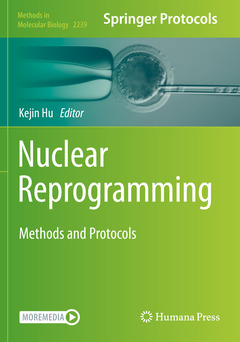Description
Nuclear Reprogramming, 1st ed. 2021
Methods and Protocols
Methods in Molecular Biology Series, Vol. 2239
Language: English
Subject for Nuclear Reprogramming:
Publication date: 11-2020
306 p. · 17.8x25.4 cm · Paperback
Publication date: 11-2020
306 p. · 17.8x25.4 cm · Hardback
Description
/li>Contents
/li>Comment
/li>
This volume provides basic and advanced protocols on somatic cell nuclear transfer, induced pluripotent stem cells, and direct reprogramming of somatic cells into different functional cells. Chapters guide readers through methods on standardized procedures for characterization of induced pluripotent stem cells, as well as those for preparation of materials required for induction of pluripotent stem cells. Written in the highly successful Methods in Molecular Biology series format, chapters include introductions to their respective topics, lists of the necessary materials and reagents, step-by-step, readily reproducible laboratory protocols, and tips on troubleshooting and avoiding known pitfalls.
Authoritative and cutting-edge, Nuclear Reprogramming: Methods and Protocols aims to ensure successful results in the further study of this vital field.
Pig Cloning Using Somatic Cell Nuclear Transfer.- Cloning of Monkeys by Somatic Cell Nuclear Transfer.- Production of Cardiomyocyte-like cells by Fibroblast Reprogramming with Defined Factors.- Production of Cardiomyocytes by microRNA-mediated Reprogramming In Optimized Reprogramming Media.- Direct Reprogramming of Human Fibroblasts into Induced Neural Progenitor Cells Using Suicide Gene Embodied Episomal Vectors for Rapid Selection of Exogenous DNA-free Cells.- Generation of Human Neurons by microRNA-mediated Direct Conversion of Dermal Fibroblasts.- Reprogramming Human Fibroblasts to Induced Pluripotent Stem Cells Using the GFP-marked Lentiviral Vectors in the Chemically Defined Medium.- Episomal Reprogramming Of Human Peripheral Blood Mononuclear Cells Into Pluripotency.- Generation of Human iPSCs by Episomal Reprogramming of Skin Fibroblasts and Peripheral Blood Mononuclear Cells.- Generation of Human iPSCs by Protein Reprogramming and Stimulation of TLR3 Signaling.- Generation of Human iPSCs by Reprogramming with the Unmodified Synthetic mRNA.- Reprogramming of Fibroblasts to Human iPSCs by CRISPR Activators.- Reprogramming Porcine Fibroblast to EPSCs.- Preparation of Mouse Embryonic Fibroblasts as Feeders for iPSC Generation and Maintenance.- Evaluate Reprogramming Efficiency and Pluripotency of the Established Human iPSCS by Pluripotency Markers.- G-banded Karyotyping of Human Pluripotent Stem Cell Cultures.- Become Competent in Generating RNA-seq Heat Maps in One Day for Novices without prior R Experience.




